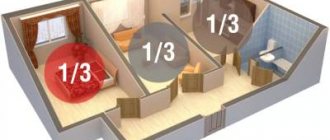About how long privatization in Russia has been extended, how to privatize an apartment if the order is lost, who has the authority to re-participate in the procedure, and also about in what cases a refusal from the authorities to transfer your home into private ownership may be received. you can find out on our website. You can sample an application for privatization of an apartment.
The concept of apartment privatization
The concept of “privatization of an apartment” in the realities of the Russian Federation means the transfer of a residential property from state ownership into the hands of private owners , most often registered in this object and living in it.
When carrying out privatization, the right of ownership of housing is not necessarily granted to only one person: everyone registered in the apartment, including minor children, can participate in the procedure.
When it is carried out, each participant receives shares in the privatized apartment as a property with the right to sell, donate or transfer to third parties in the manner prescribed by law.
More information about the procedure for donating real estate can be found here.
At the same time, even if you are registered in a non-privatized apartment, this does not give you the right to privatize it , if you have previously participated in a similar procedure with another residential property: the right to privatize according to the law of the Russian Federation is granted one-time .
The only exceptions are children under the age of 18 - they can participate in privatization before reaching the age of majority and again after reaching 18 years of age.
Features of room privatization
Quite often, several tenants and families can live in an apartment or household. As a rule, rooms in communal apartments are allocated on the terms of rental agreements. That is, in each specific case there is a separate agreement. For this reason, the tenant can privatize his room, subject to the consent of the family members living with him. In this case, the procedure concerns only the area that a person actually occupies. Common areas such as kitchens, bathrooms, and hallways are not subject to privatization. All residents without exception will have access to such premises.
Do neighbors need consent?
If a person occupies a separate room in communal housing, then he has every right to use it. If the shareholder intends to privatize the premises, then he will only need the consent of those living with him. The neighbors' opinions will not matter in this case.
Documents for privatization of an apartment
The first thing you will need to privatize an apartment is documents.
You will have to spend some time collecting them, since the list of required certificates is quite extensive.
All necessary documents can be divided into two categories :
- basic, mandatory;
- additional, allowing to clarify controversial issues regarding the privatized object.
The list of main documents includes:
- originals and photocopies of passports of all privatization participants;
The photocopy must have a sheet with a registration stamp, but it is not necessary to notarize the copies.
- certificates of marriages and divorces of privatization participants;
- birth certificates of children under 14 years of age, copies of these certificates;
- an order for an apartment or a social tenancy agreement for housing. Such documents, if they are not available to the tenants, can be ordered from the Unified Information and Settlement Center ;
- current technical passport for housing issued by the Bureau of Technical Inventory (BTI). It must indicate the square footage of the apartment, its number of floors, the number of rooms, and the plan. The technical passport must include information about the redevelopment of the apartment, if any;
- cadastral plan of the apartment, which is issued by the Cadastral Chamber;
- a certificate from the passport office or an extract from the house register about the persons currently registered in the apartment;
It is short-term, and therefore it is worth considering when applying that such a certificate is valid only 14 days after issue , and then it needs to be issued again.
- extract for the property from the Unified State Register. Issued by the MFC or the Registration Chamber stating that this apartment has not yet been privatized;
- an extract from the Unified State Register of Real Estate, providing information about the availability of other objects owned by everyone who is going to take part in the privatization of the apartment and what the grounds were for their acquisition;
- a certificate from the BTI “Form No. 2” confirming non-participation in privatization earlier for each of the applicants;
- a certificate of absence of debt on utility bills or payment receipts for the last six months.
In addition to these documents, you may also need the following additional documents:
- a statement of refusal from privatization, if one of those registered in the apartment does not want to participate in the process, but has not previously used their right to privatization;
- death certificates of people previously living and registered in the apartment;
- a notarized power of attorney, if the privatization will be executed by a person not participating in it (for example, a hired lawyer);
- a certificate from the OVIR confirming citizenship, if previously any of the participants was a citizen of another country.
This is not a complete list of additional documents. In each specific case, it can be supplemented with other clarifying certificates or papers.
Is it possible to deprivatize housing?
Quite often there are situations when the privatization procedure is cancelled. This can happen voluntarily or compulsorily. It depends on the specifics of the current situation.
Invalidation of a transaction
In some cases, the result of privatization may be declared invalid. This is possible in certain cases.
These include:
- The agreement was drawn up in violation of the requirements of current legislation.
- Privatization is fictitious, that is, it was not intended to create rights and obligations for participants.
- The procedure acted as a cover for another transaction. This may be due to the illegal sale of municipal property.
- Privatization involved persons who did not have such a right - incapacitated people or children. In this case, we are talking about the fact that these people personally signed the documents. If legal representatives acted on their behalf, then the privatization procedure is not violated.
An apartment can be deprivatized without the consent of the owner. Cancellation of a transaction is possible only by a court decision.
Voluntary transfer of housing to the municipality
The decision to transfer privatized housing to the municipality is made by the owner himself. If the premises belong to several owners, the consent of each of them will be required. In this case, the state budgetary authority will be obliged to conclude a rental agreement with the residents. Most often, this happens in cases where people are unable to financially fulfill their obligations - pay for major repairs, pay taxes. Such premises lose the status of human property and become municipal. However, part of the property cannot be returned.
Deprivatization will affect the entire apartment or household. The resident himself becomes a tenant and only has the right to live in the occupied premises. At the same time, it will no longer be possible to privatize housing again.
Stages of apartment privatization
The first stage takes place directly between the participants: you need to collect consent or refusal to participate in privatization from all persons registered in the apartment, select the owner or several owners, prepare their passport data for submission to the housing management department of the municipal district administration - it is in this division that the privatization agreement.
The next stage is the preparation of documents. It includes a visit to the EIRC and BTI, a trip to the passport office and the MFC, if the above documents are not available to the apartment residents.
After the final collection of documents, participants apply to the housing management department of the municipal district administration with an application for the right to privatize a residential property.
After considering this application and entering all the data into the EDGP register, all parties sign a uniform agreement and receive certificates confirming their rights to the privatized apartment.
How to buy?
Next, consider a scheme that will help you purchase a privatized apartment:
- Buyers decide on the choice of apartment;
- A preliminary advance or deposit agreement is concluded with the seller, where he provides the documents necessary for verification and conclusion of the transaction, the timing of the transaction is agreed upon, and the final cost is agreed upon (read about the preliminary agreement for the purchase and sale of an apartment in this material);
- The documents of the apartment owners and documents for the apartment itself are checked;
- The purchase and sale agreement is drawn up and carefully checked by both parties;
- Meeting to sign an agreement and deposit money in a safe deposit box (today this method of transferring money is the safest);
- The signed documents are submitted for registration to the Registration Chamber, where both parties to the transaction receive a receipt for receipt of the documents and an indication of the deadline for their receipt;
- At a certain time, the parties or their representatives take away the registered documents;
- The parties sign the Acceptance and Transfer Certificate of the apartment in accordance with the purchase and sale agreement.
Terms and cost of apartment privatization
Typically, the period for transferring housing into private ownership is about two months - this is the time when the application is considered by the housing management department of the municipal district administration.
You can find out more about the procedure for registering real estate here.
But it is worth considering that you will need some more time to collect documents.
You can speed up the process if you entrust the preparation of documents to a lawyer specializing in such cases.
Officially, the Russian Federation still has a free initial housing privatization program, which means that the procedure itself will not cost you anything.
This program was extended by the government until March 1, 2017 , since today about 20% of residential real estate allocated for transfer to private ownership remains non-privatized. But expenses during registration are still possible: this is the payment of state fees when ordering certificates and extracts .
Who is the owner of a non-privatized apartment?
Non-privatized housing is not private, i.e. does not belong to a person by right of ownership. This means that the apartment is the property of the state and belongs to the municipal housing stock.
Despite the fact that the privatization process lasted for years and eventually became indefinite, the share of non-privatized apartments still remained. Of course, there are advantages to using such premises, for example, reducing utility bills and not paying real estate taxes.
The landlord, represented by the state or municipality, is the owner of a non-privatized apartment, which means that the rights of use, ownership and disposal of the person who has entered into a social tenancy agreement are very limited.
Rights of the owner of privatized housing
Unlike tenants of municipal housing, the owner of a privatized apartment receives the right to a number of powers at once :
- he can sell the apartment privatized by him, rent it out under a rental agreement, and live in it;
- the owner has the right to register (register) or discharge people to/from his apartment at his own discretion;
- a privatized apartment can be the object of collateral when receiving a loan or credit;
- The owner cannot be evicted from privatized housing for debts; he will not be taken away by a court decision;
- a privately owned apartment can be redeveloped;
- upon the death of the owner of a privatized apartment, it or its shares do not pass to the state, but are inherited by the relatives of the deceased or by persons specified in the will.
Here you can learn more about the procedure for registering an inheritance.
Residents' rights
The right to housing is one of the basic rights granted to citizens by the state. It is protected by the fundamental law of the country - the Constitution of the Russian Federation.
During privatization, regardless of whether everyone participates in it or not, the following rights are guaranteed:
- every person has the right to privatization once in his life;
- if a citizen voluntarily refuses privatization, then he not only has the right to register ownership of another housing, but also a lifelong right to live in housing;
- go to court if a person believes that privatization was carried out with violations or vice versa, to allow it to be carried out without the consent of one of the residents.
Sale of a privatized apartment
You can sell a privatized apartment either entirely or its shares.
Preference in the sale of shares is given to the other participants in the privatization, but if they do not agree to the purchase within a month, the share can be sold to a third party.
When completing the transaction, a purchase and sale agreement is concluded, the buyer is given a registration certificate for the apartment, a house register, and the certificate of ownership is reissued.
The concept of common shared ownership
The concept of common shared ownership implies that the apartment is privatized for two people, with each person’s shares defined in the agreement. This context implies that each of the participants owns half of the property, but which rooms and parts are not specified.
Typically, common shared ownership is registered if living space is privatized by two persons, no matter whether they are relatives, family members or have no relationship with each other. In accordance with the law, spouses are not required to determine who owns which room, but can use the entire area on a common basis. With this design, the living space can be disposed of within the boundaries established by law, with the consent of both co-owners to carry out a particular operation.
Having initially registered the property as common shared ownership, later, for example, during a divorce, you can decide who owns which room. If it is not possible to do this on your own, then the co-owners can resolve the dispute in court.
Privatization of a share in an apartment
Since the procedure requires the consent of all potential apartment owners, the question of how to privatize a share in an apartment has only one answer: this is impossible without privatizing all other shares !
The procedure provides for the transfer of the entire object into private ownership, but with the possibility of allocating shares to individual owners.
The size of these shares may be equal, or may be different in size if, for example, one of the registered residents refused to participate in privatization and transferred his share to one of the participants.
Also, shares of a privatized apartment can be donated, transferred or sold to other participants, thereby increasing their share.
Check what?
Purchasing a privatized apartment may carry risks of recognizing the transaction as void and they should be minimized. To do this you need:
- Check documents on privatization and its transparency;
- Clarify the composition of the family and all co-owners of the apartment - whether there are any minor children among them, and whether all owners give their voluntary consent to the sale;
- If the seller is married, you need to check the period of purchase or privatization of the apartment . If at this moment the owner was married, then he must obtain the notarized consent of his spouse to sell the apartment;
- In order to ensure the adequacy of the seller, you should ask him to present a certificate from a drug and neuropsychiatric dispensary ;
- The seller’s passport is also subject to verification - it must be without inscriptions, extraneous stickers or inscriptions and correspond to the validity period;
- You need to check the documents for the ownership of the apartment , and not just the certificate.
The main document is the document on the basis of which the certificate is issued. This could be a purchase and sale agreement, a will or deed of gift, privatization, etc.
Frequently asked questions about apartment privatization
What are the disadvantages of privatization?
Before privatizing an apartment, it is worth considering certain disadvantages of this procedure.
So, the disadvantages of privatization :
- the need to pay property tax . It is still a very small amount, calculated from the book value of BTI, but it may increase;
- increase in rent , since you take part in the maintenance and repair of common building structures;
- In the absence of a will, after the death of the owner of the privatized apartment, all heirs by law will have the right of inheritance . If you want to avoid such a situation, then you must definitely write a will, and this is not a very pleasant process psychologically. Or write a deed of gift. Inheritance issues also usually cause discord in the family. If the apartment is municipal, then you can, as a responsible tenant, simply register (register) your “preferred” heir, and after your departure he will automatically receive the right of residence and become a responsible tenant;
- in case of demolition of a house, an apartment of equivalent area, not cost, is provided. Moreover, it may not be in the best area. The law specifies only the locality, but does not specify the area in which similar housing should be provided;
- if the demolition is planned by the municipal authorities, and you disagree with the housing provided to you, then you will simply be evicted by court;
- monetary compensation for demolition cannot be provided, since the state cannot buy this housing. And, if you do not particularly need the apartment that will be provided to you in return, then after the expiration of the free privatization period, you will no longer be able to sell it after privatization.
What tax is paid on a privatized apartment?
After the apartment has been privatized, you should know exactly how to pay the property tax, now called property tax.
Taxation is applied if a citizen has acquired ownership of such housing (Article 401 of the Tax Code):
- room;
- apartment;
- a private house.
The tax on a privatized apartment is calculated quite simply: you need to multiply the cost of the apartment that came into the possession of the owner through privatization by the current rate in the region .
The tax is considered local, and therefore regional authorities independently set the amount of such rates, and accordingly, the tax amounts vary.
Article 406 of the Tax Code sets the maximum rate - 0.1% of the cost of the apartment . The base for the tax on a privatized apartment is the cost of housing - previously inventory, cadastral in 2021.
It is worth noting that the first is several times lower than the cadastral assessment, since the inventory assessment carried out by the BTI takes into account only the condition of the housing, and not its attractiveness from the point of view of living in it, its location, and the surrounding infrastructure.
It is for the purpose of objective taxation of citizens’ housing that a real estate tax began to operate in 2015, including for recently privatized apartments.
From the beginning of the year, the tax base will be determined not by the BTI, but by Rosreestr, where all information about the apartments of citizens and legal entities has been entered and will continue to be entered.
Today, more than 20 regions of the country are using a new method for calculating the amount of property tax for a privatized apartment, and by 2020 it will be applied everywhere. During this transition period, a reduction factor will be applied in tax calculations.










